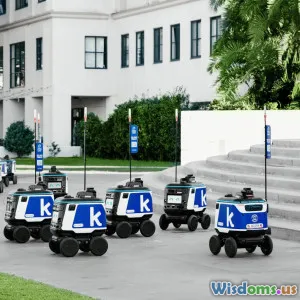
How AI is Shaping Industry Automation
9 min read Discover how AI is transforming industry automation, enhancing efficiency, and redefining job roles in today's workforce. (0 Reviews)
How AI is Shaping Industry Automation
In today's fast-paced world, artificial intelligence (AI) is not just a buzzword; it's a catalyst for profound change across various sectors. From manufacturing and logistics to healthcare and customer service, AI is reshaping industry automation in ways that enhance efficiency, improve decision-making, and redefine what it means to work. This article explores how AI is influencing industry automation, supported by examples, data, and insights.
The Rise of AI in Automation
AI's influence on automation has escalated dramatically, particularly over the last decade. The integration of AI algorithms into automation processes has allowed industries to streamline operations, reduce errors, and increase productivity. According to a report by McKinsey, by 2030, up to 800 million jobs worldwide could be displaced by automation, fundamentally changing labor dynamics.
The Role of Machine Learning
One of the primary drivers of AI in automation is machine learning (ML). This technology enables machines to learn from data and improve over time without explicit programming. Industries are utilizing ML algorithms to predict demand, optimize supply chains, and enhance manufacturing processes. For example, Amazon employs machine learning to manage inventory levels efficiently, ensuring products are available where and when customers want them.
Predictive Maintenance in Manufacturing
In manufacturing, predictive maintenance powered by AI algorithms has become a game changer. Companies like General Electric (GE) utilize sensors and data analytics to predict equipment failures before they happen. This proactive approach not only reduces unplanned downtime but also significantly lowers maintenance costs. According to GE, predictive maintenance has the potential to reduce maintenance costs by up to 30%.
Optimizing Supply Chains
AI's impact extends to supply chain optimization, where companies are leveraging AI for logistics planning and inventory management. For instance, IBM's Watson Supply Chain uses AI to provide insights that help businesses anticipate disruptions, enabling them to maintain more reliable and efficient supply operations. The application of AI in supply chains is projected to decrease operational costs by 13-15%, as businesses gain enhanced visibility and control.
AI Transforming Healthcare Automation
In the healthcare sector, AI's transformative potential is particularly remarkable. From administrative tasks to patient monitoring, AI is redefining healthcare automation.
Streamlining Administrative Duties
AI-powered tools help automate various administrative tasks, including appointment scheduling and billing. A notable example is the healthcare startup Zocdoc, which utilizes AI to match patients with the appropriate healthcare providers based on their needs and location. By automating these processes, Zocdoc reduces wait times and enhances patient experience.
Enhancing Patient Care with AI
Moreover, AI plays a crucial role in patient monitoring and diagnostics. For instance, Google's DeepMind has developed AI algorithms that can assist in predicting patient deterioration, leading to timely interventions. Hospitals utilizing AI analytics have reported reduced patient mortality rates, which highlights the critical role AI automation plays in life-saving situations.
The Evolution of Customer Service Automation
Customer service is another area witnessing profound transformation due to AI. Chatbots and virtual assistants are becoming increasingly capable, leading to improved customer interactions and support.
Chatbots Revolutionizing Customer Interaction
Companies such as Sephora and Starbucks employ AI-driven chatbots that can handle inquiries, take orders, and provide tailored recommendations based on past customer interactions. Research from Gartner asserts that by 2025, 75% of customer service interactions will be powered by AI technologies, showcasing the rapid shift towards automation in this domain.
Personalized Customer Experience
Moreover, AI enables personalized experiences by analyzing customer data to deliver targeted marketing and recommendations. For example, Netflix leverages AI to analyze viewing habits and suggest content tailored to individual preferences, ultimately enhancing user engagement and satisfaction.
The Impacts of AI on Employment
While AI contributes positively to efficiency and productivity across industries, it raises significant concerns about job displacement. As more tasks become automated, the workforce faces a potential upheaval, and many fear substantial job loss.
AI and Job Transformation
Nonetheless, it is crucial to recognize that AI does not merely displace jobs; it also transforms them. According to the World Economic Forum, while automation threatens to displace approximately 85 million jobs by 2025, it will also create around 97 million new roles that are more adapted to the new division of labor. Moreover, these new jobs will likely require human skills such as critical thinking and creativity, emphasizing the need for worker retraining and skills development.
The Future Workforce
To prepare for this transition, companies must invest in employee resilience through training programs and upskilling initiatives. Industries that prioritize workforce development and reskilling can better navigate the challenges associated with automation and ensure a smoother transition.
Challenges in Implementing AI in Automation
While AI presents numerous benefits, its adoption in automation does not come without challenges. Companies must address ethical, technical, and organizational considerations to harness the full potential of AI.
Data Privacy and Security
One major concern is data privacy and security. The extensive use of data necessary for AI algorithms raises questions about data misuse and how to protect consumer information. Hence, organizations must establish robust data governance practices to protect sensitive information and comply with regulations like GDPR.
Managing Change within Organizations
Organizations often struggle with change management as workflows evolve with AI integration. Clear communication and a well-defined strategy become critical for employers to ensure all stakeholders understand the vision for automation and their roles within that transformation.
Conclusions: Embracing the Future of Work
In conclusion, AI is indelibly shaping industry automation, heralding a wave of change that presents new opportunities and challenges alike. Its influence spans across sectors, optimizing processes, enhancing productivity, and transforming job roles. Businesses that proactively embrace AI technologies will not only boost their competitive advantage but also foster resilient workforces prepared for the future.
As we navigate this era of digital transformation, organizations must continue to explore, invest in, and develop their AI strategies for automation while considering the human element—ensuring that this technological shift serves to empower rather than replace the workforce.
Rate the Post
User Reviews
Popular Posts





















